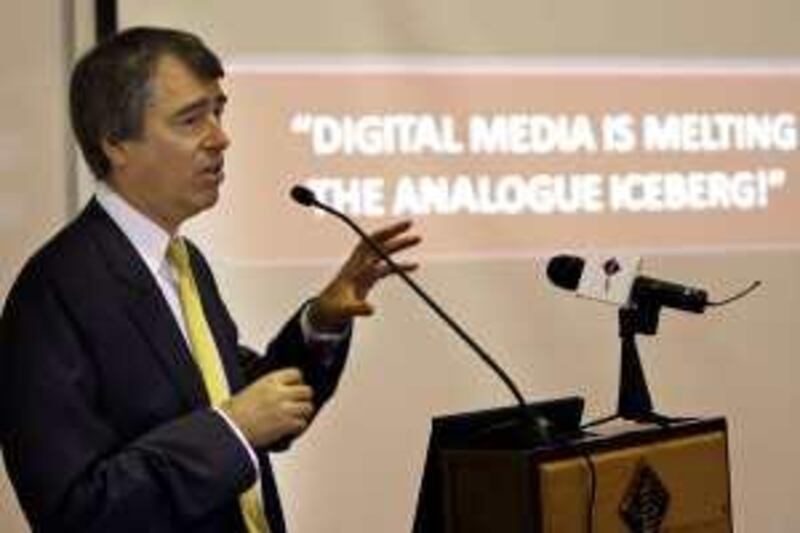Digital media is dismantling the profitability of the old business models of analogue media, levelling the global playing field and creating a historic opportunity for Middle-Eastern media companies. That was the message from Edward Borgerding, the chief executive of Abu Dhabi Media Company (ADMC), in his keynote speech at the Middle East Cable, Satellite, Broadcast and Communications Exhibition (CABSAT) yesterday. Revenue from digital media in the next couple of years was expected to overtake analogue revenue in everything from music sales to journalism, he said, although profits would be lower overall. Although this outlook was a concern to all media executives, Mr Borgerding said he was cheered by the fact that no clear consensus had yet emerged on how media companies were supposed to stay in business. "It means that the game is reset and everybody is equal; the guys in Europe are equal, the guys in Tokyo are equal, the guys in Los Angeles and New York are equal and the guys in the Middle East are equal," he said. "That means that we can be the world leaders for the next generation of media companies. Because the new business models haven't been created yet, we can create them here." The UAE had several advantages in striving to achieve this, he said, notably a lack of an entrenched media industry that was hard to steer in a new direction, access to capital, a talented skills base and an young and affluent population that could help pilot media projects to take off. But it also faced serious obstacles, particularly its low broadband penetration, Mr Borgerding said. Despite its affluence and high mobile penetration of 135 per cent, the UAE has online penetration of 43 per cent and broadband penetration of just more than 7 per cent, lagging far behind more developed markets. "If it was me, I would wire every house in the UAE to broadband, and if I was the Government, I'd pay for it," he said. "Because... it will create the ability to communicate and for information to flow, which is what creates value in a modern digital age." The lack of connectivity was a serious weakness, he said. Another weakness was the lack of cross-platform audience measurement tools, which he blamed for keeping the Middle-Eastern television broadcasters in a cash-starved state that contributed to their low production values. Mr Borgerding also suggested that such a measurement was required to coax reluctant advertisers onto the Web, where, in the Middle East, they spent only 1 per cent of their advertising budgets. This was particularly important, he said, because online social networking was by far the fastest-growing section of the digital media market. But as media struggles everywhere from the irreversible spread of the "free" model of digital distribution, media workers in the Middle East in general, and the UAE in particular, should feel optimistic, he said. "It's very rare when you can be at the birth of something, and that's what's happening in the media world right now. The new business models aren't obvious." ADMC owns The National. khagey@thenational.ae
Digital media to thrive in Middle East
The fall in profit level for traditional media has leveled the playing field for regional companies.

More from the national




